Worry (verb): give way to anxiety or unease; allow one’s mind to dwell on difficulty or troubles.
Life is unpredictable, and that by itself can cause any one of us to worry or “give way to anxiety or unease.”
In our experience, worry can manifest itself in many different ways. Sometimes worry triggers us to work harder, believing we can strategize our way out of our unease. Other times, we handle our worry by living in denial, never admitting the level of impact our worry is having on us.
Or maybe we respond to worry by getting angry, feeling like if we channel our energy toward a target of blame somehow that worry will disappear.
Can all your worries add a single moment to your life? [28] “And why worry about your clothing? Look at the lilies of the field and how they grow. They don’t work or make their clothing, [29] yet Solomon in all his glory was not dressed as beautifully as they are. [30] And if God cares so wonderfully for wildflowers that are here today and thrown into the fire tomorrow, he will certainly care for you. Why do you have so little faith?
Matthew 6:27-30 NLT
You might be convinced that worrying away about a situation is productive; the more you worry the more you feel like you care about the issue. However, as we learn from this scripture, pining away about our worries is frivolous.

Instead, the Bible tells us to shape our worries into prayers:
Don’t fret or worry. Instead of worrying, pray. Let petitions and praises shape your worries into prayers, letting God know your concerns. Before you know it, a sense of God’s wholeness, everything coming together for good, will come and settle you down. It’s wonderful what happens when Christ displaces worry at the center of your life.
Philippians 4:6-7 MSG
Spirituality is the ability to let go of control and learn to turn to God in prayer. Here is a biblical prayer guide to help those like us (the chronically worried) learn how to shape our worries into prayer.
Choose God instead of choosing worry
As Jesus and the disciples continued on their way to Jerusalem they came to a village where a woman named Martha welcomed them into her home. [39] Her sister Mary sat on the floor, listening to Jesus as he talked. [40] But Martha was the jittery type and was worrying over the big dinner she was preparing. She came to Jesus and said, “Sir, doesn’t it seem unfair to you that my sister just sits here while I do all the work? Tell her to come and help me.” [41] But the Lord said to her, “Martha, dear friend, you are so upset over all these details! [42] There is really only one thing worth being concerned about. Mary has discovered it-and I won’t take it away from her!”
Luke 10:38-42 TLB
The story of Martha and Mary provides us with a great illustration of how spirituality is a choice. Two sisters were faced with the same circumstances, but chose to respond differently.
Martha was worrying and upset over all the details, which led her to not prioritize her connection with Jesus. Mary chose instead to concern herself with the spiritual – listening to what Jesus had to say.
I can relate to Martha. I often allow worry and anxiety to take my focus off God and instead overthink my way out of my anxieties. I do this by trying to control and strategize everything, from my daily chores to the demands of parenting two young children and the responsibilities of my job.
This “strategizing” leads me to be very self-reliant rather than spiritual. Worrying is a choice I make that consumes quite a bit of my mental and emotional energy. I can choose instead to direct that energy toward being spiritual and growing my relationship with God.
He alone is my safe place; his wrap-around presence always protects me. For he is my champion defender; there’s no risk of failure with God. So why would I let worry paralyze me, even when troubles multiply around me?
[5] I am standing in absolute stillness, silent before the one I love, waiting as long as it takes for him to rescue me. Only God is my Savior, and he will not fail me. [6] For he alone is my safe place. His wrap-around presence always protects me as my champion defender. There’s no risk of failure with God! So why would I let worry paralyze me, even when troubles multiply around me? [7] God’s glory is all around me! His wrap-around presence is all I need, for the Lord is my Savior, my hero, and my life-giving strength. [8] Join me, everyone! Trust only in God every moment! Tell him all your troubles and pour out your heart-longings to him. Believe me when I tell you-he will help you! Psalm 62:2, 5-8 TPT
This scripture helps me to understand that a large part of overcoming worry is deciding to view God the way he really is based on the Bible, rather than allowing my emotions or circumstances to dictate the way I see him.
This psalmist describes God as someone who “always protects” him, his “champion defender” who won’t let him fail, his “savior,” “hero,” and “life-giving strength.” He describes God as someone we can trust every moment, and share all our troubles with, waiting for him to come through for us.

My view of God is often too small. I often look to him as someone I want to bless my plans after I’ve anxiously thought through them and strategized, with the hopes of maintaining some sense of control.
The psalmist realized he wasn’t in control of his life, but that God was, and his trust in God anchored him.
Pause and reflect:
- How do you think your view of God affects your level of worry?
- In what areas of your life do you feel tempted to overthink or strategize your way out of anxiety?
Choose honesty
I went to the LORD for help. He answered me and rescued me from all my fears.
Psalm 34:4 GW
Choosing honesty means being truthful with God about our fears and admitting the areas we need help.
I have always been someone who keeps to myself. I am not someone who wears my heart on my sleeve. I internalize everything, only to implode when I reach my max. When I hold my worries and anxieties inside, God ends up having little to no say in how I feel or think about a situation. Instead, my imagination leads me to come up with more things to be anxious about.
Video: Give Your Worries To God
Being truly honest about what I am anxious about gives God the space to influence my heart. As this scripture says, God answers me and rescues me from all my fears.
1-2 What happiness for those whose guilt has been forgiven! What joys when sins are covered over! What relief for those who have confessed their sins and God has cleared their record.
3 There was a time when I wouldn’t admit what a sinner I was. But my dishonesty made me miserable and filled my days with frustration.
Psalm 32:1-3 TLB
I personally don’t always love talking about sin, and I have yet to meet a person who does. But this scripture tells us that honesty brings happiness and relief. And on the contrary, if I am dishonest I will be frustrated and miserable. So if we want to find relief and happiness when we pray, we have to be willing to confess our sins and admit our guilt.
When I am not honest about my sin and guilt, I become even more worried and anxious. I become worried that God won’t really love me, and I worry what other people would think of me if they knew the truth.
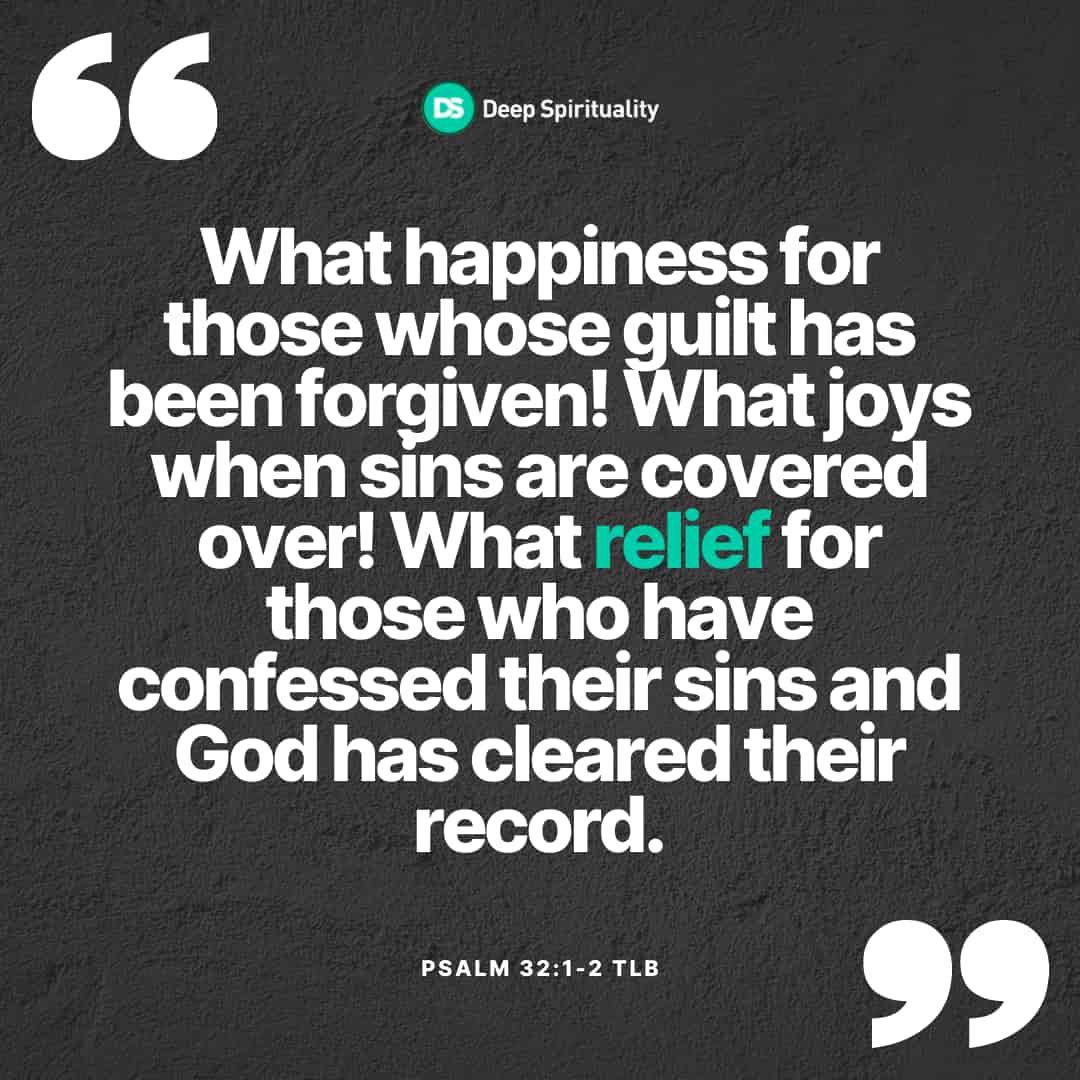
The Bible tells us that confession of sin actually brings relief. Confession is not simply stating a sin, but agreeing with God about its damage and turning back to him. This kind of honesty leads to the relief we so desperately seek.
Choose vulnerability
Then some came and reported to Jehoshaphat, saying, “A great multitude is coming against you from beyond the sea, from Aram; and behold, they are in Hazazon-tamar (that is Engedi).” [3] Jehoshaphat was afraid and turned his attention to seek the LORD; and he proclaimed a period of fasting throughout Judah. [4] So Judah gathered together to seek help from the LORD; they even came from all the cities of Judah to seek the LORD.
2 Chronicles 20:2-4 NASB
I am both challenged and inspired by the heart of humility King Jehoshaphat displayed here. Worry and fear seized him as he heard the news of an imminent attack from “a great multitude” of enemy forces. But he responded in a remarkable way.
Jehoshaphat immediately turned his attention to God, and vulnerably admitted that he needed help:
Our God, will You not judge them? For we are powerless before this great multitude that is coming against us; nor do we know what to do, but our eyes are on You.” [13] All Judah was standing before the LORD, with their infants, their wives, and their children.
2 Chronicles 20:12-13 NASB
If you’ve ever been in a position of leadership – in the classroom, in the athletic arena, on the job, or in your family – you probably know how hard it can be to lead with vulnerability. I tend to believe that as a leader, I need to be strong. When faced with opposition my instincts tell me to buckle up, toughen up, and show no fear.
Jehoshaphat was the king of an entire nation and I think it would have been easy for him to respond similarly. Although internally he might have “freaked out” I would think he’d at least do it privately behind closed doors out of fear that his image and reputation as a king would be diminished.
However, in vulnerability King Jehoshaphat did the opposite and illustrates to us what true spirituality is. He publicly admitted through prayer that he was powerless to defend against this attack, he did not know what to do, and yet he trusted God to guide them. King Jehoshaphat said this in front of everyone – his men, their wives, and all the children.
Pause and reflect:
- In the face of fear, is your response to pray?
- How easily do you admit to God and others when you feel powerless?
- How easily do you admit to God and others that you have no idea what to do?
[15] and he said, “Listen, all you of Judah and the inhabitants of Jerusalem, and King Jehoshaphat: This is what the LORD says to you: ‘Do not fear or be dismayed because of this great multitude, for the battle is not yours but God’s. [17]You need not fight in this battle; take your position, stand and watch the salvation of the LORD in your behalf, Judah and Jerusalem.’ Do not fear or be dismayed; tomorrow, go out to face them, for the LORD is with you.” [30]…So the kingdom of Jehoshaphat was at peace, for his God gave him rest on all sides. 2 Chronicles 20:15, 17, 30 NASB
God responds to King Jehoshaphat’s vulnerable prayer by telling him not to fear; the battle is not his, but God’s. This is a great reminder because when we are anxious, we tend to spend a lot of energy worrying about battles we think we won’t really have to fight in the future.
For example, on more occasions than I care to admit I’ve been so worked up about a potential conflict with someone that I procrastinate and prepare my position only to find out that there is no confrontation. It’s simply made up in my mind.
A while back, my wife discovered she had some new dietary restrictions. I was trying to be supportive so I told her I would cut out dairy along with her. Shortly afterwards, I gave a friend a ride home and he left his pizza in the backseat of my car. He told me he was too full and said I could throw it away if I didn’t want it. Temptation got the best of me and I quickly ate a slice and then tossed the rest in the garbage.
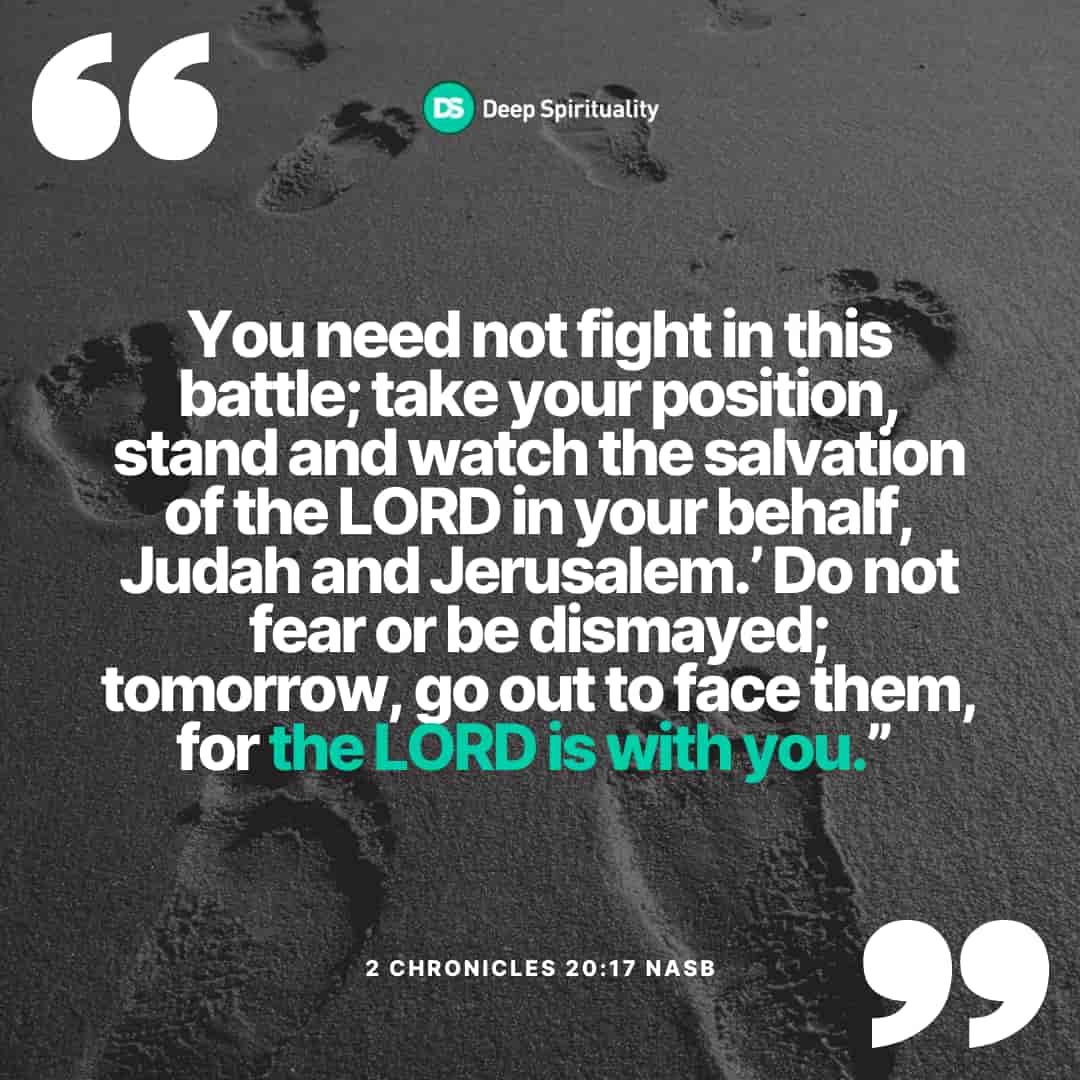
I remember sitting parked in the driveaway of my garage worrying about how I would justify to my wife that I went off our diet plan. As I nervously began to explain to her the story of how it happened … she casually shrugged and moved on.
What I learned from this is that I can waste so much time and emotional energy on potential conflicts that don’t even exist. This is a way I try to seek control of my anxieties instead of vulnerably praying and talking about my fears.
Choose trust
God cares for us and gives us a way out of being consumed by worry. He wants to take our worries away from us so we can be calm, confident and at peace.
Cast your cares on the Lord and he will sustain you; he will never let the righteous be shaken.
Psalm 55:22 – New International Version
[6] Therefore humble yourselves under the mighty hand of God [set aside self-righteous pride], so that He may exalt you [to a place of honor in His service] at the appropriate time, [7] casting all your cares [all your anxieties, all your worries, and all your concerns, once and for all] on Him, for He cares about you [with deepest affection, and watches over you very carefully]. 1 Peter 5:6-7 – Amplified Bible
To cast our cares on God is a two step process. First, as we covered earlier, we need to honestly let him know what all our cares are – the good, the bad and the messy. Letting God into every part of our lives doesn’t need to be perfect or look a certain way. It just needs to be full of truth.
Second, casting our cares on God means letting go of those cares, and that requires that we trust God to take them off of our hands. If we don’t trust that God cares about us and will take care of our needs, listing them out to him won’t do us any good. We’ll still carry the weight of our anxieties ourselves.
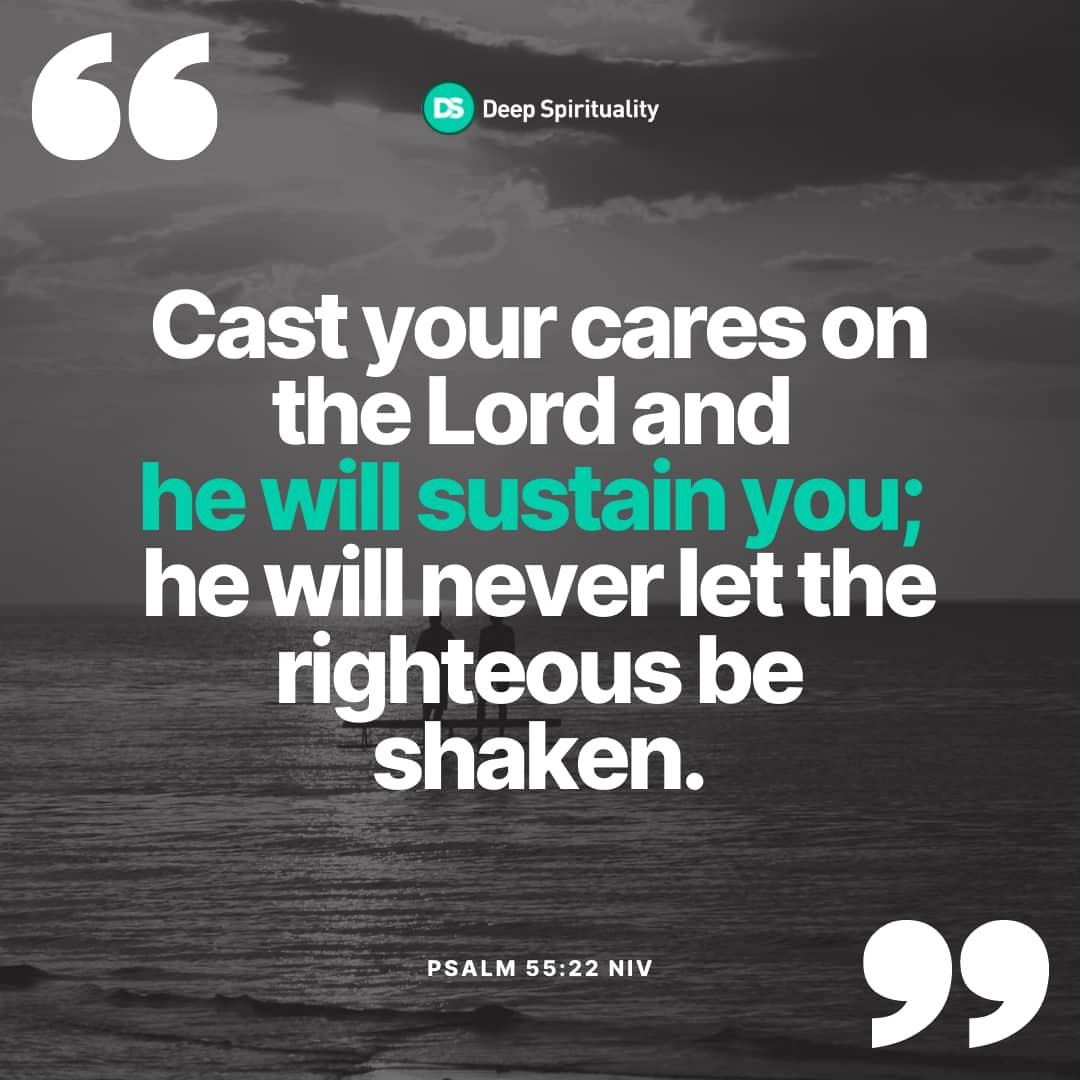
As a young boy my dad taught me how to fish. When learning to cast my hook deep into the lake I needed to let go of the fishing line I was holding onto at the right moment. I remember holding onto the line too long while swinging the pole and when I did that, the hook would instead swing back toward me. And on more than one occasion the hook got stuck in my pants and shirt or would swing towards my dad.
This is what it can be like when we hold onto our worries. We don’t get rid of them and they come back to cause us or others pain. When I’m holding onto my worry or fear I get anxious, easily irritated, I move too fast, and I focus on myself. Needless to say this doesn’t inspire others to be close to me.
Reference guides
In summary, we’ve put together a quick reference prayer guide to each of the sections we talked about above. We added some extra scriptures to read as you pray and a few simple choices you can make when you feel worried.
Save the graphics and bring them with you to guide you as you pray. By making a few simple choices, we can transform our prayer life by leaving our worries behind and replacing them with faith and hope in what God can do.
How To Choose God Over Worry
- Remember – what God has done in your life and in the Scriptures (Psalm 143:3-6)
- Believe – in what God can do (Jeremiah 32:27).
- Choose – to believe in God’s way over your own way (Proverbs 3:5-6)
- Meditate – on a scripture that helps you to choose God over control (Psalm 119:152 NLT)
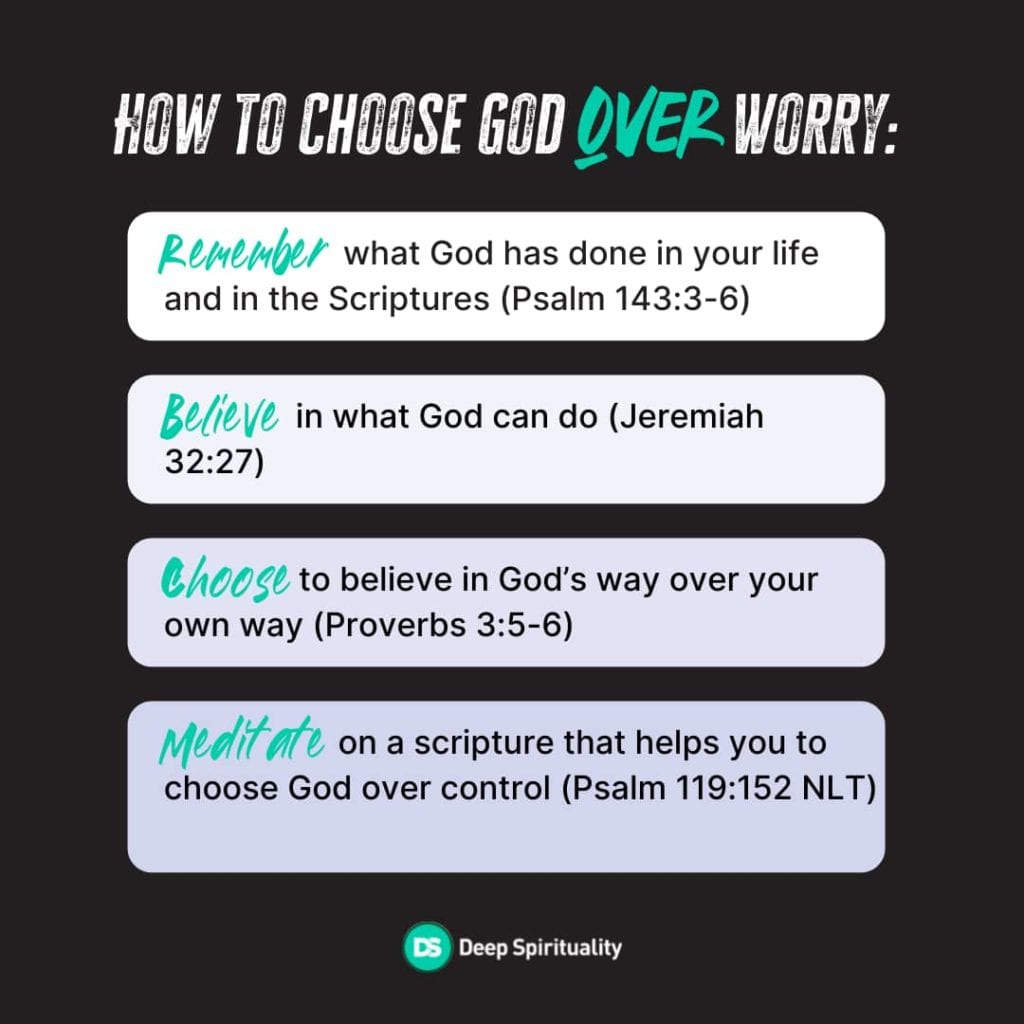
How To Choose Honesty When You’re Worried
- Emotions – Pray about what you feel and why. Start with these five basic emotions as a guide: mad, sad, glad, embarrassed, afraid. (Mark 14:32-42)
- Sin – Pray about what sins you see and why you chose them. How are they affecting God and people? How will you repent of them today? (Mark 7:20-23, Luke 18:9-14)
- Needs – Pray about what you need help with and what others need help with. (Matthew 7:7-12)
- Gratitude – Pray about what you are thankful or grateful to God for in the past and present. (Philippians 4:6-7)
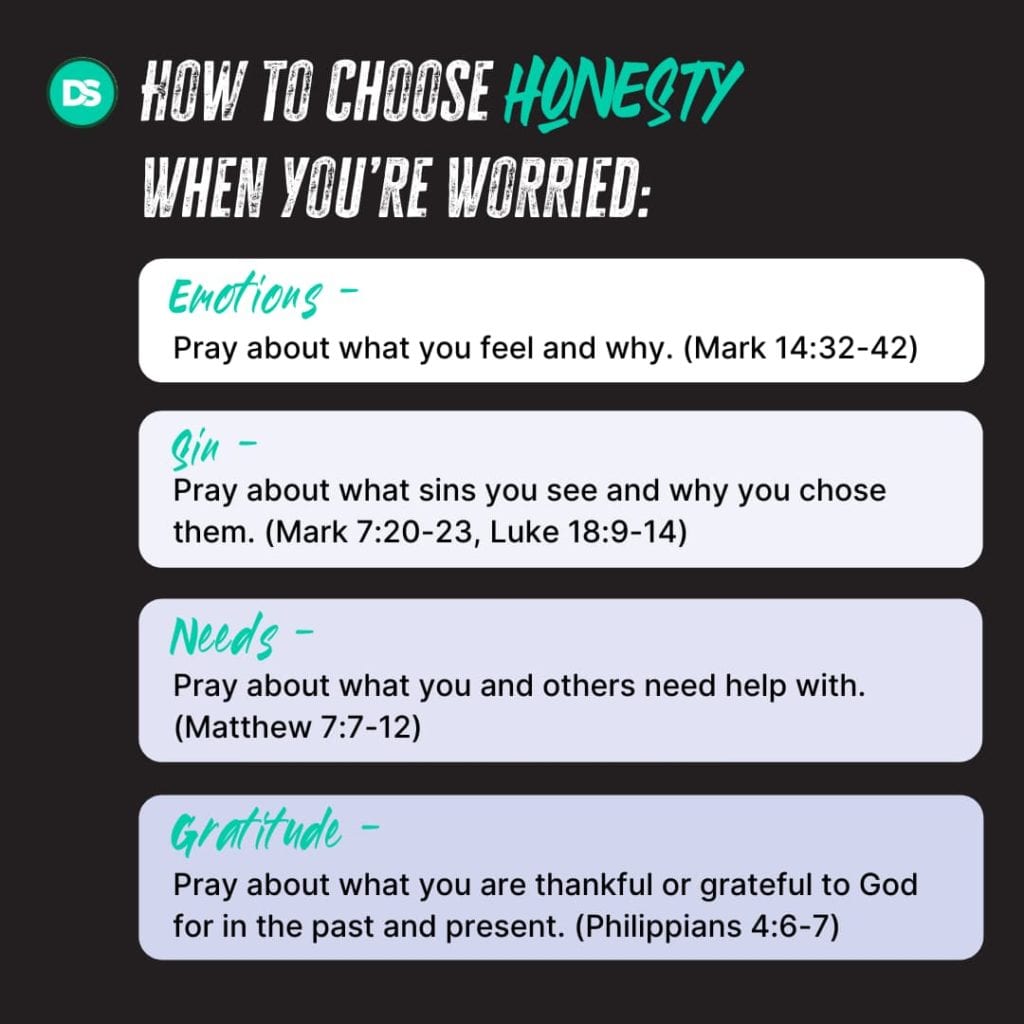
How To Choose Vulnerability When You’re Worried
- Share, don’t shield– identify what is causing you fear, insecurity, or worry. (2 Chronicles 20:1-4)
- Powerless Is powerful– explore how you feel inadequate or incapable to handle what is in front of you. (2 Chronicles 20:12)
- No ducks, no problem– Our ducks don’t have to be in a row. Be willing to admit to God when you don’t know what to do. (2 Chronicles 20:12)
- Together is better– choose to be vulnerable and pray with others. Don’t keep your feelings to yourself. (2 Chronicles 20:13-15)
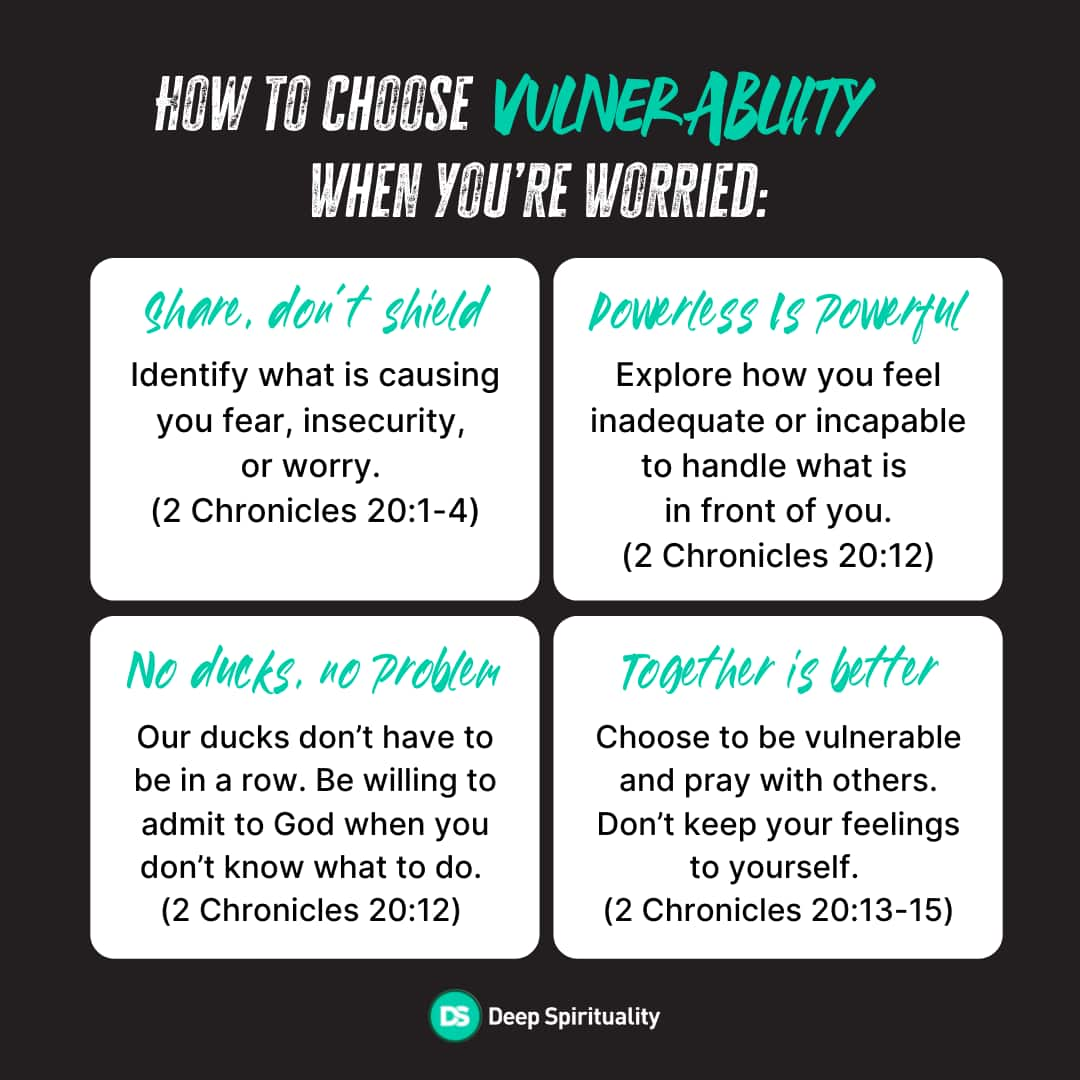
How To Choose to Trust God With Your Worries
- Take courageous action – Make a decision to trust God with your worries. Ask God what courageous actions you can take to put your faith into practice. (James 2:22)
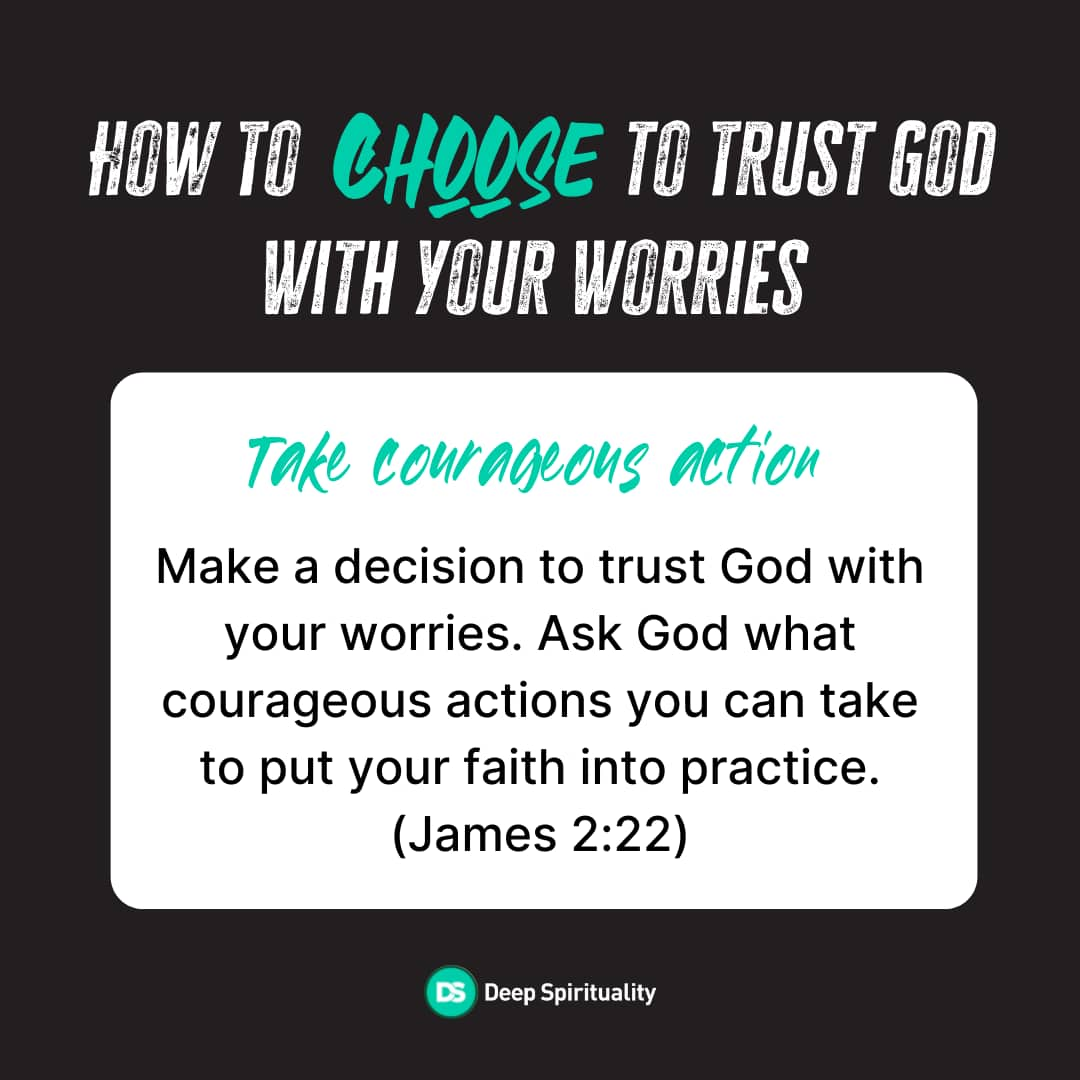
Explore more:
Brian was a world-class judo competitor from San Jose State University. His experiences as a fighter and as a counselor have given him a unique perspective that he brings to his contributions to Deep Spirituality.
Brian was a world-class judo competitor from San Jose State University. His experiences as a fighter and as a counselor have given him a unique perspective that he brings to his contributions to Deep Spirituality.





